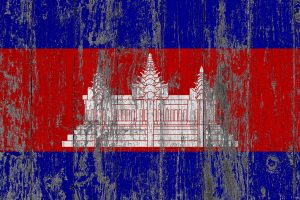One of Cambodia’s last independent news organizations ceased its operations this morning after Prime Minister Hun Sen ordered the revocation of its license, the latest sign of an escalating crackdown ahead of national elections due in July.
In a post on his Facebook page on Sunday night, the Cambodian leader said that the Voice of Democracy, known commonly as VOD, would no longer have a license to publish or broadcast from 10 am local time this morning – instructions that were duly carried out by the Ministry of Information.
“Commentators tried to attack me and my son Hun Manet,” Hun Sen wrote in his message, according to Reuters’ translation, referring to a February 8 article that VOD published about aid given by Cambodia to aid Turkey’s earthquake recovery.
The article in question reported that Manet, the deputy commander for the country’s armed forces and Hun Sen’s heir designate, had signed the aid agreement – a presumed breach of government protocol. Hun Sen said that the article had hurt the “dignity and reputation” of the Cambodian government.
Late last night, Hun Sen rejected an apology from the head of the Cambodian Center for Independent Media (CCIM), which runs VOD and is funded by a number of foreign NGOs and institutes and ordered the Ministry of Information to revoke its license.
At 10 am this morning, police blocked the road outside VOD’s office in Phnom Penh, and served a letter informing the publication of the revocation of its license. A number of Cambodian ISPs have since reportedly blocked VOD’s website. Speaking outside VOD’s office this morning, CCIM’s Media Director Ith Sothoeuth said that he was hopeful the publication would win a reprieve. CCIM was founded in 2007 in order to promote “independent media, press freedom, freedom of expression, access to information and internet freedom.”
VOD, which publishes and broadcasts in both English and Khmer, is one of the few independent media organizations to have survived the crackdowns of the past decade. This period has seen the closure or effective silencing of the two major independent newspapers founded during the United Nations peacekeeping mission of 1992-93, the Cambodia Daily, which was forced to close in 2017 after being presented with a massive unpaid tax bill, and the Phnom Penh Post, which was sold under government pressure to CPP-friendly investors from Malaysia the following year.
Since then, VOD has absorbed much of the country’s surplus journalistic talent and carried on the mission of holding Cambodia’s political class to account. Most recently, the publication has distinguished itself by its in-depth reporting on the large-scale Chinese-run cyber scam operations that have exploded in Cambodia over the past few years, particularly in the coastal city of Sihanoukville. VOD’s series of reports on the human trafficking associated with these industrial-scale scam operations has been a subject of considerable embarrassment for the Cambodian government, especially the links that surfaced between these operations and prominent tycoons and elite grandees.
Whether or not the closure of VOD is a direct result of its reporting on this issue, “the Cambodian government has never liked VOD’s reporting,” Phil Robertson of Human Rights Watch said in an emailed statement, “and given Prime Minister Hun Sen’s authoritarian attitude towards independent media it’s likely VOD has been living on borrowed time for a while.”
Still, given VOD’s history of publishing much more openly critical reporting about Hun Sen’s administration, the article that prompted Hun Sen to withdraw his indulgence was curiously innocuous. This in turn suggests alternative explanations for the sudden revocation of VOD’s license.
The first factor of note is the national election due in July. Historically, Cambodia’s political space has expanded and contracted in rough alignment with the five-yearly electoral cycle, tightening prior to polls and then relaxing after Hun Sen’s Cambodian People’s Party (CPP) believes its hold on power is secure. This pattern, which has held even amid the CPP’s broader move toward more openly authoritarian rule, partly explains why the government has permitted VOD to publish since the crackdown that preceded the national election of July 2018, even though the government at the time. forced many radio stations to stop carrying VOD broadcasts.
In a statement, the rights group Amnesty International said VOD’s shutdown was “a blatant attempt to slam the door on what’s left of independent media in the country, and a clear warning to other critical voices months before Cambodia’s national elections.”
The other question is that the “offending” article touched obliquely on the looming handover of power from Hun Sen to his son, an issue of considerable political sensitivity. For Hun Sen, a lot is riding on the succession, which is expected to take place sometime between this year’s election and the next national poll in 2028. It is intended to enshrine the legacy of his own 40-year rule and ensure that the CPP remains firmly embedded in power for the foreseeable future.
Yet the handover, which requires the buy-in and support of a broad swathe of the CPP’s galaxy of regional and personal power centers, is also a point of flex around which intra-party rivalries could potentially emerge. For this reason, Hun Sen needs to ensure that the social and political situation is stable prior to the handover.
Whatever the exact cause, the closure of VOD, should it end up being permanent, will be an incalculable loss for an independent media scene that has borne more than its share of heavy blows over the past decade.

































